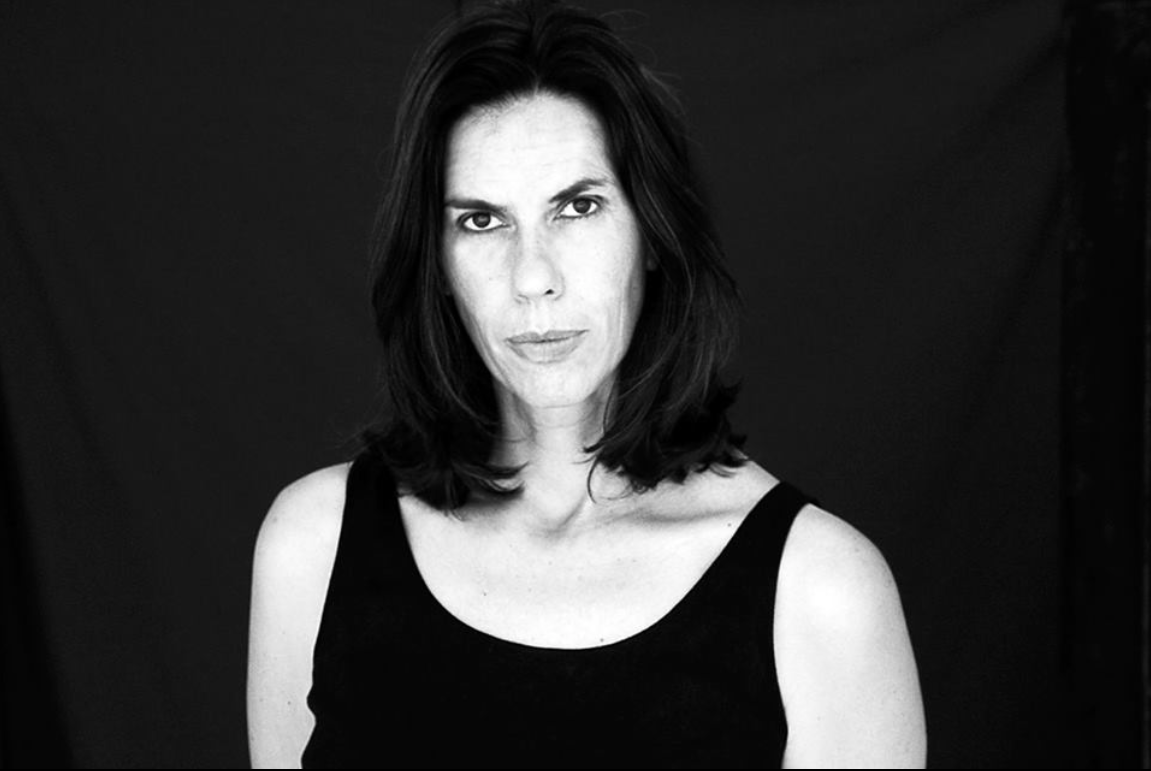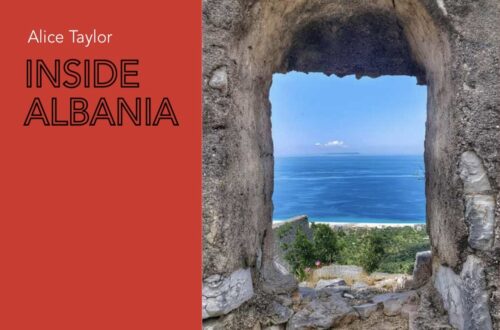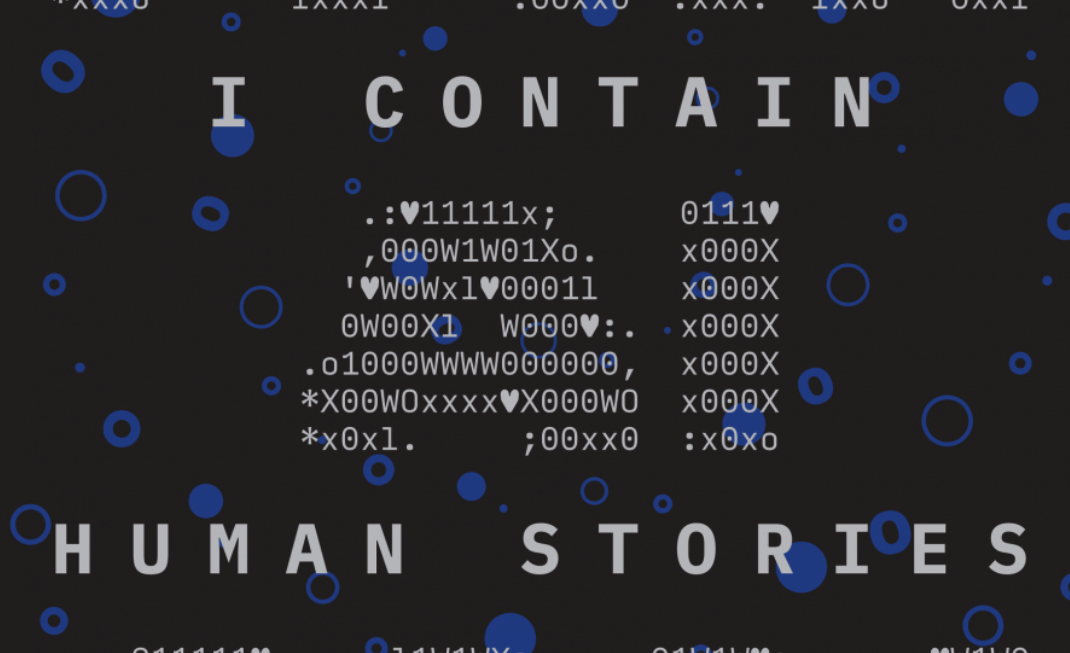“I am not doing one of those lifestyle interviews you know!”
She looks at me sternly but with an undeniable glint in her eye and the hint of a smile at the corners of her mouth. I assure her that my interests in her go far beyond her favourite Albanian dish or what her favourite clothes shop is.

Jutta Benzenberg describes herself as a photographer, as well as a humanitarian and social reporter with imagery as her medium. Her father was a photographer and handed her a camera at an early age- she then locked herself in her room for two days and took photos of everything she possibly could. Upon seeing the images Jutta had taken, her father was impressed with her obvious natural talent, and from that single moment in 1978, photography and the aesthetic arts became her path.
As we sit on the veranda in the midday sun, the calm is interrupted by the tinkling of a wind chime, and the same breeze carries the scent of the flowers that she planted in her garden. I start our conversation by asking her if she can remember the first time she realised she was an artist and became aware of the fact that she saw the world through different eyes.
“I remember being a little girl growing up in Neuwied (incidentally the town where the last King of Albania Prince of Wied comes from) . It was around 1968. My parents were out and I was alone with my brother at home and I thought to myself “hmm what can I do?”. I took a record and placed it on the record player- I don’t recall the song now- but I put the music on and was alone and free to enjoy it. I danced around and saw the world in a different way, being free and moving the furniture around to make it look better. This was the first time I thought “wow, I need to do something that is creative”.

After studying at the prestigious Staatliche Fachakademie fur Photo Design in München, she worked locally as a photographer for magazines, theatres, and even as a cameraman on television productions. Then, in 1991 for the first time, she visited the newly formed Republic of Albania, with the man that would later become her husband- prolific activist and writer, Ardian Klosi (*1957-; † 2012). During this trip, she documented the turbulence and volatility of those times on film and compiled them in their first book called “Albanisches Überleben” which was published in 1993. Later that year, another book followed entitled ‘Sombre Beauty’ 2001, in turn, followed by Ahead with the Past which was published in 2011.
Jutta is tall, striking, beautiful and blunt- she is direct in the way she speaks like only a German can be, yet she emanates the warmth and playfulness that I have begun to associate with the Balkan people.
“In Germany, we are often cold and distant and we do not show our emotions- as a young girl I was so confused by these people, I still am.”
She continues;
“In my work, I look for emotion and the people in Albania do not hide their emotions. Sometimes it can make me tired, but mainly it gives me something, and makes me feel like I am human and really living.”

Jutta’s main passion is portrait photography- stark images that allow you to look right into the soul of the subject- a real juxtaposition of humanity and the often harsh circumstances of their surroundings. These images are a paradox, showing the warmth of the human soul and the bare bones of who these people are, but at the same time showing the harsh realities of Albanian society over the last 27 years. She feels like I do about Albania, that there is an energy and a certain magnetism in everything here and it serves as a seemingly never-ending source of inspiration.
“When you have this energy around you, when in pictures they are not shy to show their emotions- they let me into their soul. Albanian people have something mystic and deep about them and I like this very much- this is not something you find elsewhere.”
She tells me how she is the type of person that gets bored and frustrated easily but finds the Albanian people fascinating and enthralling in a truly unique way;
“It doesn’t matter who they are, where they come from, or their status they want to know how you are, what you are doing, how you feel, how the children are- we just don’t do this in Germany.”

The conversation shifts to privilege and the issues around how to balance living in a developing country with having the advantages of a Western upbringing. Jutta involves herself in many social and philanthropical issues- from highlighting humanitarian plights in her photos to fundraising to build schools in the North and South of Albania. She does this work to give something back to the country she now refers to as home and as she talks about the happiness it gives her to help others, especially children, her face lights up and she talks in such a way that you can see the fire in her eyes.
“People say that the government is not doing enough, but they cannot just do it alone. We need to learn to work together.” She adds in an animated manner.

She is also passionate about the need for more education- not just in schools, but from the television, media and the wider society both in Albania and in every other country in the world. Teaching people about responsibility, teaching them about the consequences of their actions, and teaching them not to complain, but rather to be active is the key to the change in both a local and global mentality.
“We are all responsible for what is around us- for me, we are all one family. For things to get better, we need to make changes, even just small things.“

Jutta believes that the prevailing attitude of complaining but not doing anything about it is a mirror and a reflection of the person uttering the words. Through her work, she wants to show the beauty that exists in the far forgotten parts of the country as well as the streets of Tirana. She believes that people need to be reminded that life is not just about being rich and being beautiful is not just about having the latest hairstyle and clothes. Through her portrait photography, she wants to show those people that live in the villages and mountains, those that have been forgotten by society, but that deserve to be acknowledged.
“Albania is a bit forgotten in Europe, and these forgotten people in turn, forget the forgotten. It’s absurd.”
Sighing and then smiling, she continues;
“I think of this man by the road with his 2 or 3 goats and I wish that I could know what he thinks. What is he thinking about all day? It must be like Buddhism- with no mobile- a simple existence. I think perhaps when I am 70 or 80 I would love to do just this.”

The subjects of her images are just normal people that she encounters on her travels-travelling to the deepest parts of the country, she never plans ahead and has no idea of who she will meet along the way.
“Suddenly I see a person, I fall in love with them, and I have to photograph them. They have an aura or special eyes and as I take their picture I get a view into their soul. I don’t know how I do it but I have a very deep connection with them at that moment.”
You can see this in her work- her images give me the feeling that I am stood face to face looking right into the core of someone’s very being- you forget the fact that it is a photograph that was taken a world away from you, but for just a moment, you are a part of it.

“Such a beautiful boy in a nice suit and sneakers in an old room with a beautiful light”
These subjects are normal people- to Jutta, it doesn’t matter if they are famous, it doesn’t matter about their stories, or what their status is- what interests her is what is curious or beautiful about them. Her first portrait of this type was back in 1992. She met with the renowned Albanian author, linguist, and writer, Martin Camaj who at that time was living in exile from his country. After hearing that she would be travelling to Albania, he asked her and her husband to go and visit his family who were living in the mountainous highlands of Dukagjin and it was there that she first met and photographed his brother Gjergji. He was around 80 years old at the time and she was captivated by his wizened face that told a tale of the hard life in the mountains. When she looked at the portrait she had taken, she was utterly amazed and thought to herself “how did I do this” as the light, the background, and the look in his eyes was just perfect. It was then that she realised she had to pursue this new method and she set about. trawling the streets of Tirana to capture images in a similar vein These images were then used to make her second book, “Sombre Beauty”.

Today in Albania, in a time where the prospect of joining the EU hangs heavily on societies minds, we need to understand the importance of keeping the Albanian identity. Whilst, of course, joining the EU will have its benefits- they will have to pay for it as well- the cost of living, the changes to the way of life, the mass exodus of hundreds of thousands of bright minds will all come at a dear cost to society.
Jutta is a part of realising, appreciating and keeping this cultural identity alive. Through her work, she highlights the forgotten and unseen people and places and gives them a platform to express themselves through her art. She is not a politician, she is not an activist, she is an artist and a human rights photographer- she believes in education, supporting children and teaching them how to improve their situation as well as the society around them. She wants to make Albanians understand that the poor are beautiful as well, that the countryside and environment is bursting with raw beauty, and that beauty is not just something found on the streets of Blloku

She is currently working on two new ideas- one of which will focus on the men behind domestic violence. She wants to highlight the pressures and expectations in Albanian society that can contribute to a situation that sees 1 in 2 Albanian women fall victim to domestic violence during their lives. The project is called “It’s a Boy” and she wants to show the feelings of young boys during their transformation into men and the pressures of society that results in them dancing in this violent way.
We agree that there is a lot of pressure placed on gender roles in Albanian society- women are expected to be beautiful, meek, quiet, and chaste, whilst the men are meant to represent the pinnacle of masculinity.

“A lot of the men when they are little boys, the mothers fall in love with them…he can do what he wants and becomes the boss…the child sees how his mother is treated and becomes deeply confused…”
She continues:
“Albanian men demand respect. There is this guy in the village, he is not in the Kommuna, he is just a normal man who wants to be someone and to be respected. He adopts this behaviour- a certain walk, an angry facial expression, having loud conversations on the phone, then going home to hit his wife- it creates a false sense of respect. Demanding not to be forgotten, but I think and hope it will change.”

Despite this negative reality, both Jutta and I share a deep love of Albania and those that live here. She first became interested in the country after seeing photos of boats full of refugees all fleeing after the fall of communism. Then, meeting her husband in Munich, their love, and her love of the country blossomed as they travelled through the country- her as a photographer, and him as a journalist. She tells me how upon meeting his mother for the first time, she felt like she was home and the magnetism and pull of Albania and its people have kept her here in her home ever since.

“Every little flower in this garden I put with my hands, everything in the house is with our thoughts, Everything here is a reflection of me- this is my home.”

Today, her two children Hanna and Katharina both live and study in Berlin where they have both pursued paths that reflect the life’s work of their parents. She smiles from her eyes and the word’s gush from her lips when she speaks about her children;
“They both have parts of my personality- their homes, how they are dressed, how they think- what they have more than me is that they are very modest. I am a bit of a diva, but they are very very modest and I like this very much. They have much of their father as well- they look like him as well as being similar in their ways- activism, social activism, and the need to fight for a better future.”
For the last two years, she has been bringing groups of students to Albania so they can hone their technique and see the country as she sees it. At first, she was overwhelmed by the prospect of having to condense 30 years of knowledge and experience into classes, but being able to impart her profession, her skill, and her passion to others has made her incredibly happy.

The students that come to her are people who already know about photography- they know their camera, they know how to edit, and they know how to take a photo. They come to Jutta to learn how to see into the soul of their subjects and how to tell a meaningful and poignant story through their images.

With several new projects underway and the possibility of exhibitions in the near future, Jutta is keeping herself busy and stimulated. Her work serves as a vital social and humanitarian commentary to everyday life in Albania and her work allows us to see parts of this place and its people that many people never get to see. In a strange way, it is almost an invasion of privacy, but it is a beautiful one that awards us with sensations that move you from your very core.
After meeting Jutta, I see that the woman behind the camera is just as powerful and raw as the images she creates and I cannot help but think that a bit of her soul is present in these images as well.
Follow The Balkanista!



